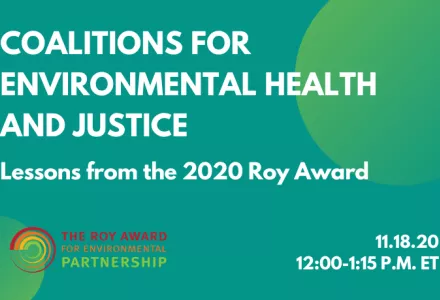Panelists
Jennifer Hoponick Redmon is an expert in environmental health science and chemical risk assessment who leads complex projects involving protection of human health and the environment. Her dual graduate degrees include a multifaceted education in environmental chemistry, toxicology, risk assessment, environmental policy, and natural resource management. Ms. Redmon is also a certified hazardous materials manager.
With a background in the scientific and policy areas of environmental science and natural resource management, she offers a blend of practical field expertise, technical knowledge, managerial skills, and a commitment to improving public health. Her strong interdisciplinary background enables her to devise and lead projects covering a variety of technical areas. Redmon is co–project director of the RTI study Clean Water for Carolina Kids, which aims to identify the presence of lead in drinking water at child care centers and schools in North Carolina and to help provide low-cost, feasible recommendations to reduce the risk of exposure to lead in drinking water for vulnerable populations. She is also co–project director for a U.S. Department of Agriculture (USDA) National Institute for Food and Agriculture Grant in partnership with Duke University to characterize the potential human health and crop health risks associated with the use of oilfield-produced water for crop irrigation. Ms. Redmon also is co-leading RTI efforts to identify risk factors associated with chronic kidney disease of unknown etiology in Sri Lanka and globally. Other current projects include environmental technical support for federal agencies to support regulatory rulemaking and guidance development. She is interested in linking chemicals and toxins found in the environment with exposures, supporting risk identification, communication, and mitigation measures that improve environmental health outcomes, and improving global sustainability, food safety, and natural resource management in the food–energy–water nexus.
Vikki Crouse is a Policy Analyst and NC KIDS COUNT Project Director at NC Child. As Policy Analyst, Vikki leads NC Child’s Environmental Health Program to ensure that children have the opportunity to grow up healthy and meet developmental milestones in an environment free of toxicants. She also manages North Carolina KIDS COUNT data program, providing advocates and decision-makers with reliable data to better understand child well-being. Vikki joined NC Child in January 2019. She holds an MSW from UNC-Chapel Hill.
Kristi Pullen Fedinick is the Senior Scientist and Director of Science and Data and Healthy People & Thriving Communities at NRDC. She brings over 20 years of multidisciplinary research experience to her projects at NRDC and has worked for more than a decade at the intersection of science and public policy to advance data-driven, health-protective, community-oriented solutions. Pullen Fedinick’s work at NRDC assesses, integrates, and leverages health and environmental data to advance protections for people and communities that are disproportionately impacted by drinking water contamination and exposures to harmful chemicals. She has authored multiple policy reports, peer-reviewed articles, and policy comments, and served on numerous influential committees of the National Academies of Sciences and the Environmental Protection Agency. Pullen Fedinick received her B.S. in biochemistry and molecular biology from the University of Maryland Baltimore County and her Ph.D. in molecular and cell biology with a concentration in structural biology and biophysics from the University of California, Berkeley. She was a Robert Wood Johnson Foundation Health and Society Scholar at the Harvard T.H. Chan School of Public Health. She is based in NRDC's Washington, D.C., office.
Ronnie Levin worked at the Environmental Protection Agency (EPA) for almost 40 years. She was critically involved with EPA’s major lead regulations throughout that time including being part of the core team responsible for reducing lead in gasoline. Ronnie realized the crucial role of lead contamination of drinking water; indeed, she wrote EPA’s book on reducing lead in drinking water and instigated for EPA’s actions to control those exposures. Ronnie has also developed methods for monetizing lead’s health damages, including neurological effects; she published a method, referred to succinctly as ‘IQ-earnings’ in 1986 to support EPA’s proposed regulation of lead in drinking water. This is now the standard metric for cognitive damage.
Since leaving EPA, Ronnie has been teaching and managing the water and health program at the Harvard TH Chan School of Public Health. Recently, Ronnie has developed methods for One Health analyses that array data across humans, animals and the natural environment. She has 2 recent One Health lead articles, one on lead seasonality and the other on the urban lead burden.
Cristine Russell, this panel's moderator, is an award-winning freelance journalist who has written about science, health and the environment, particularly climate change, for four decades. She is a senior fellow at HKS’ Environment & Natural Resources Program who works with the Arctic Initiative and is a former HKS Adjunct Lecturer in Public Policy.
Russell has written for Columbia Journalism Review, Scientific American, the Atlantic, Undark and other publications and earlier was a national science reporter for The Washington Post and The Washington Star. She is active in efforts to improve international science journalism and communication to the general public about controversies in science. At HKS, Russell has organized speaker series on Climate, Energy and the Media. She was a Spring 2006 Fellow at the HKS Shorenstein Center on the Press, Politics and Public Policy.
Russell is past President of the Council for the Advancement of Science Writing and of the National Association of Science Writers. In 2020, Russell was elected to the American Academy of Arts and Sciences. She is an honorary member of Sigma Xi, the scientific research society, and fellow of the American Association for the Advancement of Science.




